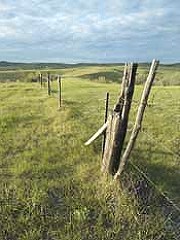
Review of Very Far North
Richard Wakefield on Tim’s second collection
The first fifth of Timothy Murphy’s Very Far North, subtitled “No Place for Trees,” surveys rural North Dakota, a land that has been losing population for a century. The people who hang on are like the trees in the poem from which the section takes its title: “A few scrub oaks survive / droughts, blizzards, and disease.” Later, in “The Last Sodbusters,” they are described directly, etched and scored by the land that they in turn have ploughed: “Care furrows the brow / and bows the straightest frame.”
Unlike Murphy’s previous collection Set the Ploughshare Deep, this book has no illustrations or prose passages to contextualize the poems, nor does it need any. For all their meticulous craft, the poems here evoke the senses, the sights and sounds, smells and textures of a place that grudgingly, sporadically repays all that human ingenuity and perseverance can do and that just as often frustrates it. Here, for example, from “Unposted,” we see a life’s work dwarfed by the sweep of time and geography:
Abandoned where the grass grew lank and damp,
the antiquated grain drill seemed a toy
some Lilliputian farmer might employ
to plant a field small as a postage stamp.
Elsewhere we hear the voices of people accustomed to expressing themselves succinctly, perhaps to save breath against the incessant wind. A “Master Farmer,” maimed by his machinery, says, “The picker took my fingers / to fertilize this land.” On a Sunday morning “while country wives are praying,” a “Godfearer” runs his plow across “the powdery plain” and offers his own supplication to heaven: “Now where’s the goddamn rain?” Not content with sweat, the land demands the farmer’s very flesh. No amount of effort can make up for the rain that doesn’t come on time and the wind that does, making the biblical “dust to dust” quite literal.
Very Far North takes its title from a line in Frost’s “There Are Roughly Zones,” in which an orchard keeper acknowledges the folly of planting fruit trees at a high latitude but also admires, it seems, the very human refusal to let nature have its way unchallenged. Farming is both the most natural and the most artificial of our occupations: even as we depend upon the forces of nature we try to channel them into unnatural forms. In a harsh land like North Dakota, the effort fails as often as it succeeds.
In a sense that doesn’t involve nearly as much dirt and sweat, a formal poet does the same thing. Murphy shapes the natural cadences of speech into tight, formal verse, often trimeter lines with (usually) perfect rhymes that in the hands of a lesser poet would sound stilted. But like the successful farmer who makes the land yield far more than it would untended, Murphy turns colloquial talk into music. These are poems not only meant to be sung but almost impossible not to sing. Their music is as engrained as the lines in that sodbuster’s face.
The third part, “Elsewhere,” broadens the scope. It portrays not merely a change in venue but a change of heart — or perhaps something unchanging in our deepest nature: the need always to be pressing onward, outward. “A fisherman longs for the land-locked farm / its tenant would trade for the sea,” Murphy sings in the second of the two ballad stanzas of the title poem.
This upland bird hunter and abandoned farm stalker turns out to be an avid sailor. In many poems he trades the horizon-wide plains for an even wider sea where he is no less at the mercy of wind. Like farming, hunting, and hiking, though, sailing is another discipline that involves finding the art in nature and the nature in art — and not unlike poetry. Murphy’s verse can be the boustrophedon of a plowed field, and it can, equally, be the zigzag tack of a sailboat. Here, in its entirety, is “The Watch,” a poem about sailing, love, and poetry:
When I leave this little ship
(which I can ill-afford)
springlined in a slip
I leave my love aboard.
If the weather is in doubt
he scans the sky for signs.
When the spring tide runs out
love will adjust my lines.
Those concluding lines, in particular, work in various distinct but complementary ways. The “spring tide” that “runs out” is quite literal but also suggests the onset of age that we all hope our love will outlast; the “lines,” of course, are real ropes holding a real boat, but they are also lines of poetry and, perhaps, the bonds ofaffection, lines that contract and attenuate but, with luck, always hold.
Finally, in “Timing” Murphy writes about the aspiration that motivates a life well lived and a poem well written:
Walking a narrow path
where pilgrims go astray,
I regulate my breath
because I cannot pray.
By “pray” he must mean the rote, conventional prayers of his boyhood. These poems are all prayers, each original and each vital, sung in the regulated breath of a voice both disciplined and wayward.

Page last updated: Wednesday, March 21, 2007